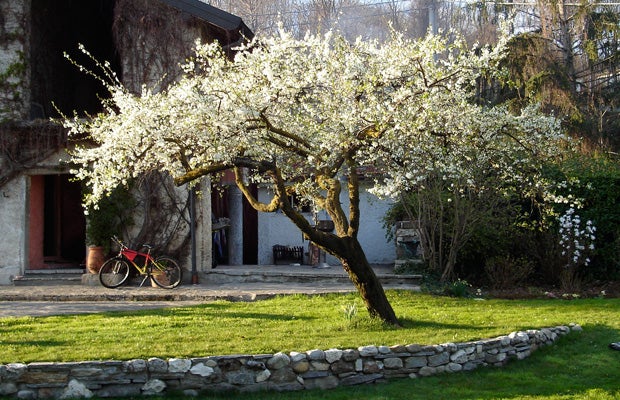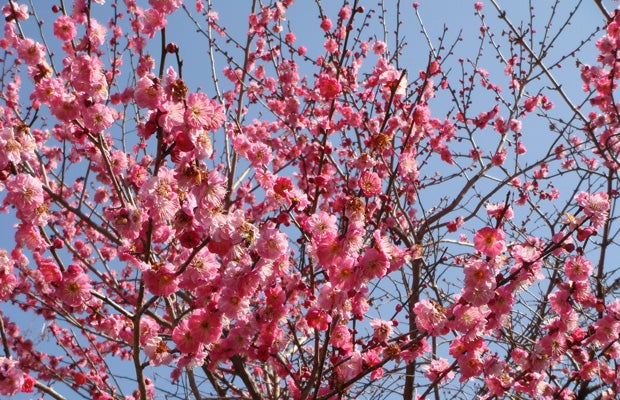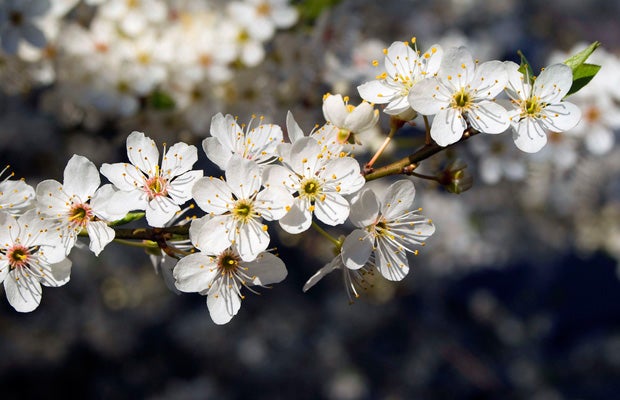Home-grown potatoes without the digging
ListenMike McGrath advises his listeners in growing raspberries, the benefits of ants in a home garden, developing soil for a new raised bed, planting a warm season lawn, the dangers of staking a tree, and how to grow potatoes above ground. Plus, Mike speaks with Dr. Phillip Kaufman, a professor at the University of Florida, about unusually large mosquitoes.
Questions of the Week:
What’s your take on growing potatoes in garbage cans? I was told it was easier to harvest because you don’t have to dig them out of the ground, and it contains them in a smaller area. True?
— Rachel in Effingham, Illinois
Last year, I tried planting potatoes in 32-gallon trash cans. I drilled one-inch diameter holes in the sides and lined the bottoms with galvanized mesh. I put six inches of potting mix in the bottom of each can, put the seed potatoes in, covered them with mix, and as the plants grew, regularly added more mix, leaving just the topmost leaves exposed, until the buckets were full and the plants were growing out the top. One set of purple potatoes grew well, but the Yukon Golds wilted and the stems just fell out of the soil. What did I do wrong?
— Dave in Newark, Delaware
Learn how to build potato towers and grow potatoes at home »
-
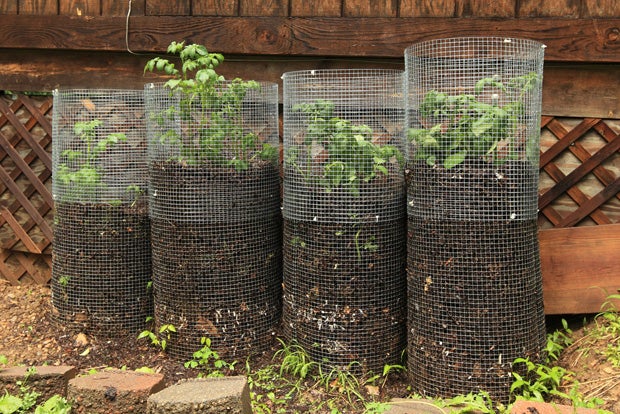
Potato Towers. Photo by Flickr user wormwould
Highlights from show for May 18, 2013:
How to grow raspberries
Scott from Rosholt, Wisconsin wants some advice about planting raspberries. While his original idea was to provide plenty of fresh compost and high quality soil, Mike explains that that is exactly what someone shouldn’t do with this berry. “Compost should never be wasted on raspberries. Raspberries are one of the strange plants that do best in really lousy soil, really poor, nutrient lacking, unattended soil. As long as it drains well and doesn’t hold water, raspberries will thrive there,” he encourages. Mike also explains how raspberries in particular need room to spread and send up new shoots. Scott can make a strong rhizome barrier, then till the soil upwards. The best time for him to dig out the raspberry canes is when it’s really wet and cloudy out. But most importantly, Mike stresses, “These things prefer to live in a boarding home with bedbugs and mice, not a lush hotel, not the four seasons!”
“Raspberries are one of the strange plants that do best in really lousy soil, really poor, nutrient lacking, unattended soil. As long as it drains well and doesn’t hold water, raspberries will thrive.”
Mike McGrath
-
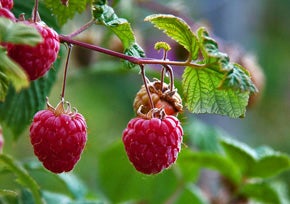
Photo by Flickr user Mark Robinson
Are ants helpful or harmful to a home garden?
Jessica from Edmond, Oklahoma was cleaning up her garden when she tipped over a large rock and found a huge nest of black ants underneath. Concerned with whether or not these pests may be problematic to her garden, she consults Mike. “The jury is somewhere between ‘out’ and ‘indecisive’ on this,” he says, “ants are both good and bad in a garden situation.” While they are extremely beneficial in that they aerate and loosen the soil, eat weed seeds, and are detractors of termites, they also can become a problem in that they feed off and encourage aphid reproduction. However, as long as there is adequate rainfall and other nutrients for the ants to eat, they shouldn’t be a bother to the garden. In the event that they were eating the plants or if there were aphid issues, simple boric acid bait traps could be used to remedy the situation.
Special guest: Dr. Phillip Kaufman
Mike talks with Dr. Phillip Kaufman, associate professor of veterinary entomology at the University of Florida at Gainesville, about the supposed invasion of huge mosquitos into the United States. To start off, Dr. Kaufman makes a point to clarify many of the misconceptions that have been made in the media about this mosquito. While we often hear about the mosquitos “immigrating” or “invading” America, the truth is that this rural species of mosquito is in fact native to America. In addition, the extreme embellishment of the size of the mosquito as being the size of cars or small children is also untrue. Though not that large, these mosquitos are larger than normal mosquitos and are about half the length of an index finger.
“It’s a species that takes advantage of the conditions that are presented to it,” Dr. Kaufman says. This is a species that comes from fresh still water that exists temporarily from different rain or storm cycles. “The females don’t randomly lay their eggs, they recognize through smells that the soil type has the right bacteria and whatnot that indicate that it’s going to be a flooded area. She’ll deposit her eggs and these eggs can sit in the soil for years waiting for a rainfall event,” he says. “It’s scientific name is Psorophora ciliata … and insect repellant works perfectly fine against it, so if people are smart about how they protect themselves, they really will not have a problem with this. Most people will never encounter this mosquito and …. in the long run, this mosquito is not capable of transmitting the viruses that cause illnesses in people.”
-
Gallinippers — Large mosquitos in Florida
Developing the soil for a new raised bed garden
From Cherry Hill, NJ first year gardener Kate has a question about the soil and compost she should use in her new raised bed garden. She started her seeds inside and ordered a company’s mix of compost soil. Should she mix the soil with something else or is it fine the way she received it? Since compost and soil can be composed of so many different things, it is hard for Mike to know what exactly her soil mix is without seeing it. He recommends Kate to read the articles in the A-Z Garden Answers Archives about first year gardeners, raised beds, and compost definitions. “You should never be afraid to use store bought plants the first year you’re gardening, and then second find out exactly what’s in that raised bed, and if it’s just some sort of weird topsoil when they’re confronted, go out and buy some really good yard waste compost-that’s black compost made of shredded fall leaves- and spread that an inch on the tops,” Mike says.
Growing a lawn in the spring season
Alice in Honeybrook, Pennsylvania is looking for advice in developing a lawn after fresh excavation. Her husband’s ready to go buy grass seed and hay to lay down, but Mike explains that this is bad timing to plant a cool season lawn. If Alice and her husband do not want to wait until fall to plant their lawn, Mike advises planting a warm season lawn like zoysia grass, or springing for sod to lay down on the property. He also recommends ditching the hay idea: “I don’t understand this concept of hay … I have a whole boxful of emails right now from people whose lawns are half grass and half hay and what do they do with it? And I [say] ‘Go back in time, read my advice and don’t smother your emerging lawn with any kind of mulch! Just keep it moist as it’s coming up and it’ll do fine.’ I never understood this concept of hay on top of a lawn.”
How to straighten a leaning tree
Gordon from Doylestown, Pennsylvania lost a lot of mature trees due to Hurricane Sandy and other smaller storms with heavy winds. Worried his leaning ornamental plum tree will soon suffer a similar fate, Gordon adjusted the tree to a complete 90-degree angle and secured its new position with stakes and wire. He asked Mike how long it will take the tree to adjust and allow for the stakes to be removed.
Mike responded: “I don’t see this tree surviving staked for more than a couple of months … If you’re an amateur arborist, you can move trees around, you know you can sever roots … but no tree can handle being girdled by something around its circumference.”
Mike went on to recommend that unless he’s able to support the tree lightly without a lot of tension, Gordon should release the tree from bondage and then prune it creatively to achieve visual balance for his crooked tree.
Slideshow below: Plum blossoms in bloom
— This week’s post was written by Jolie Higazi, You Bet Your Garden Intern
WHYY is your source for fact-based, in-depth journalism and information. As a nonprofit organization, we rely on financial support from readers like you. Please give today.



